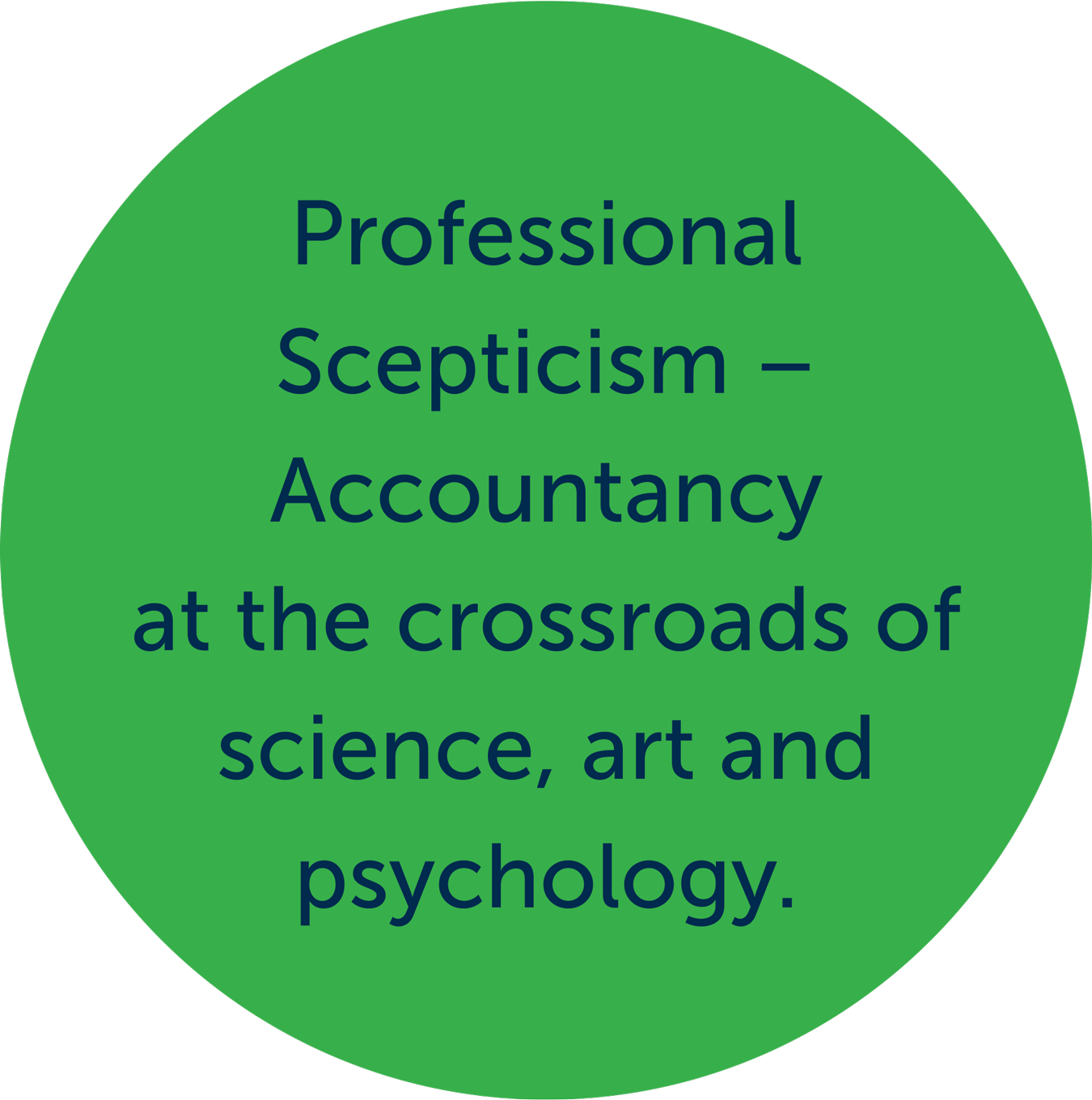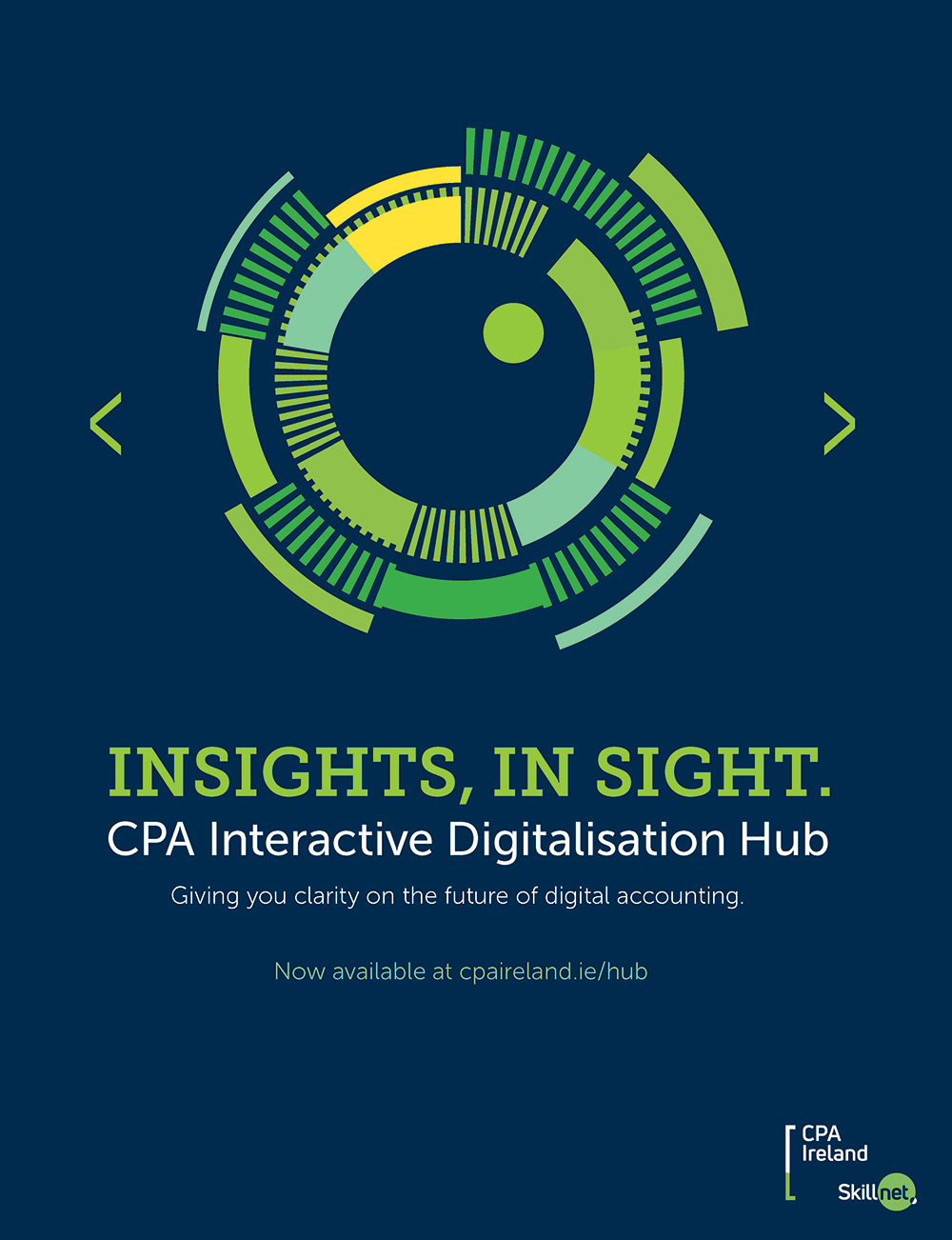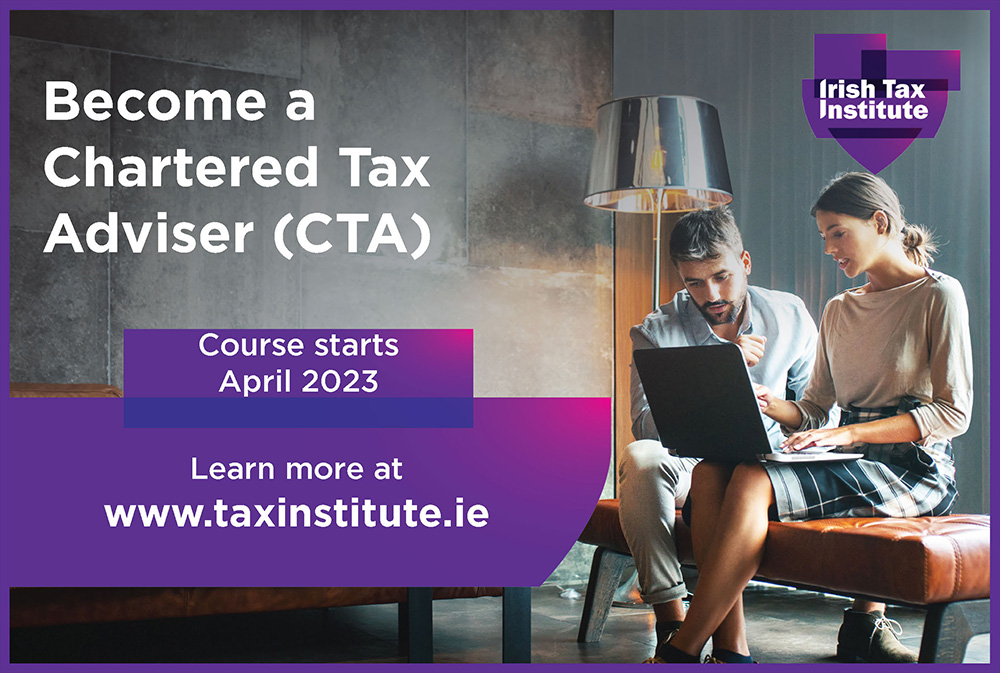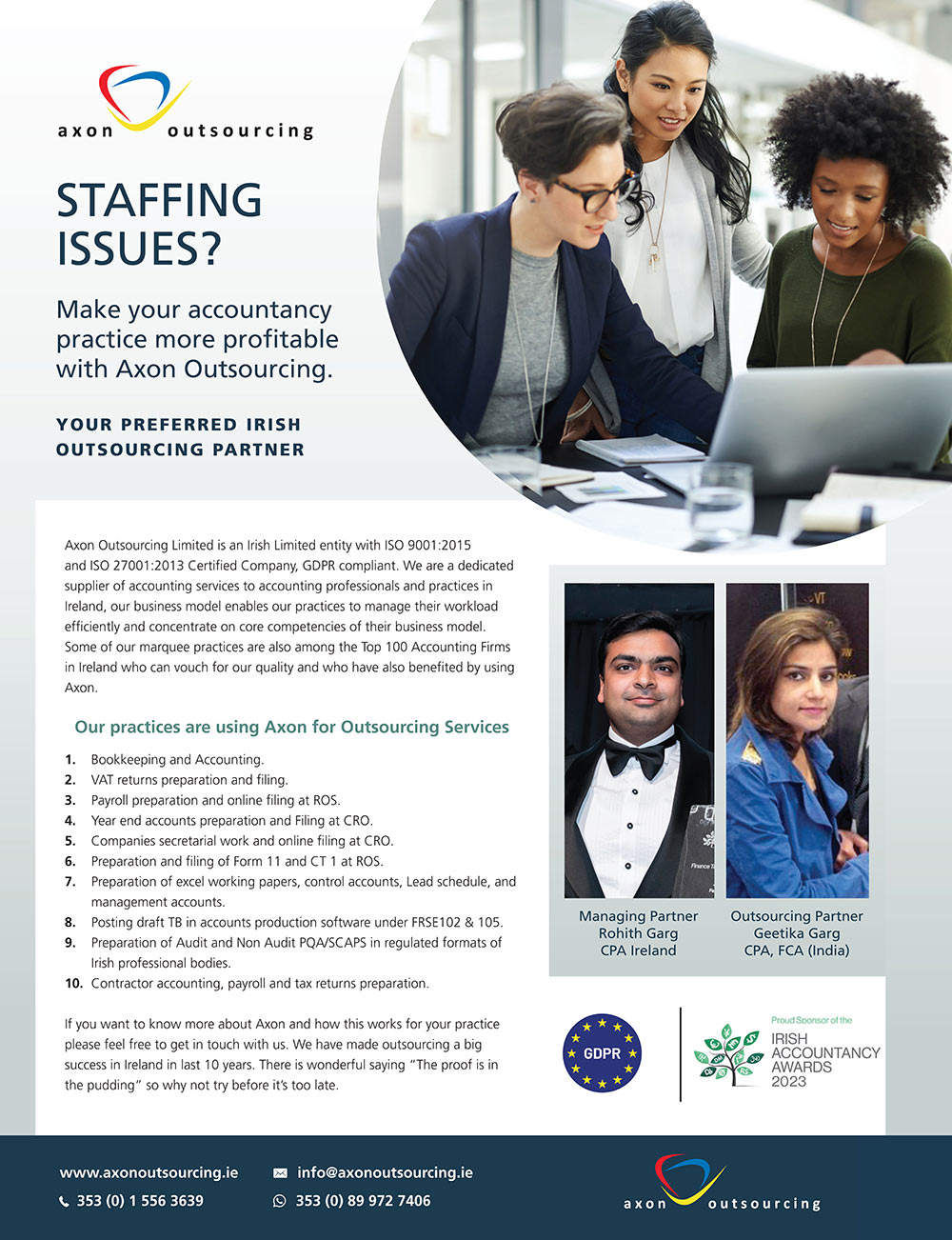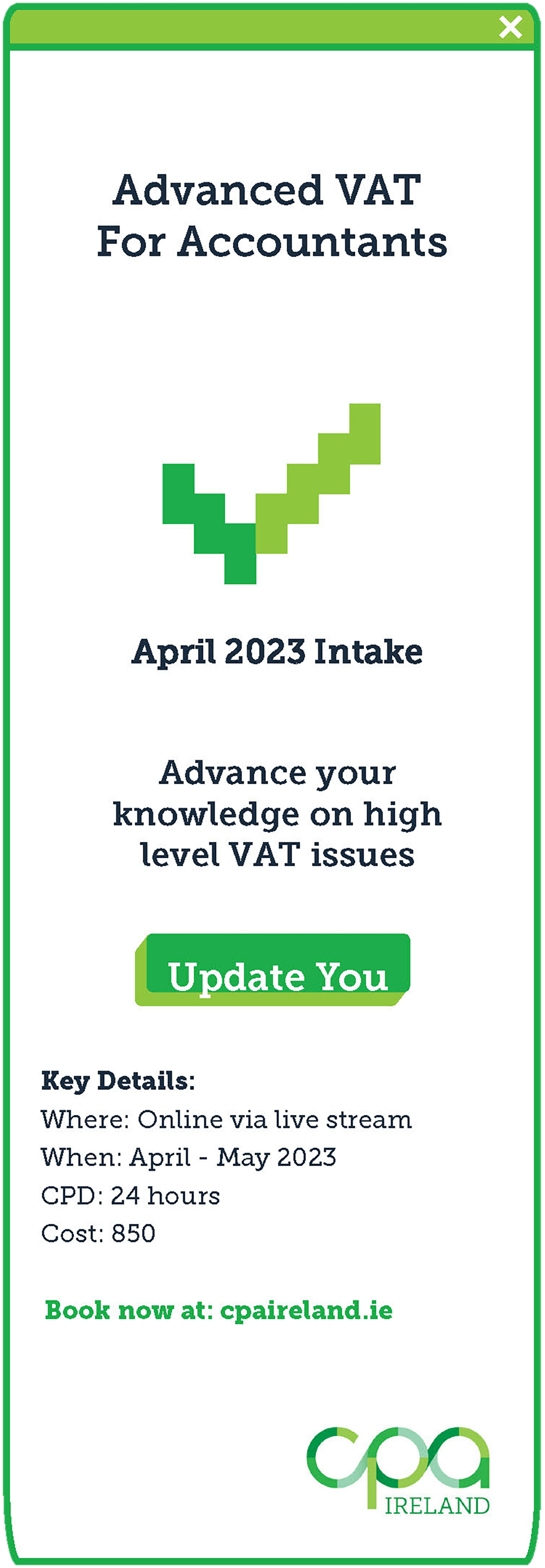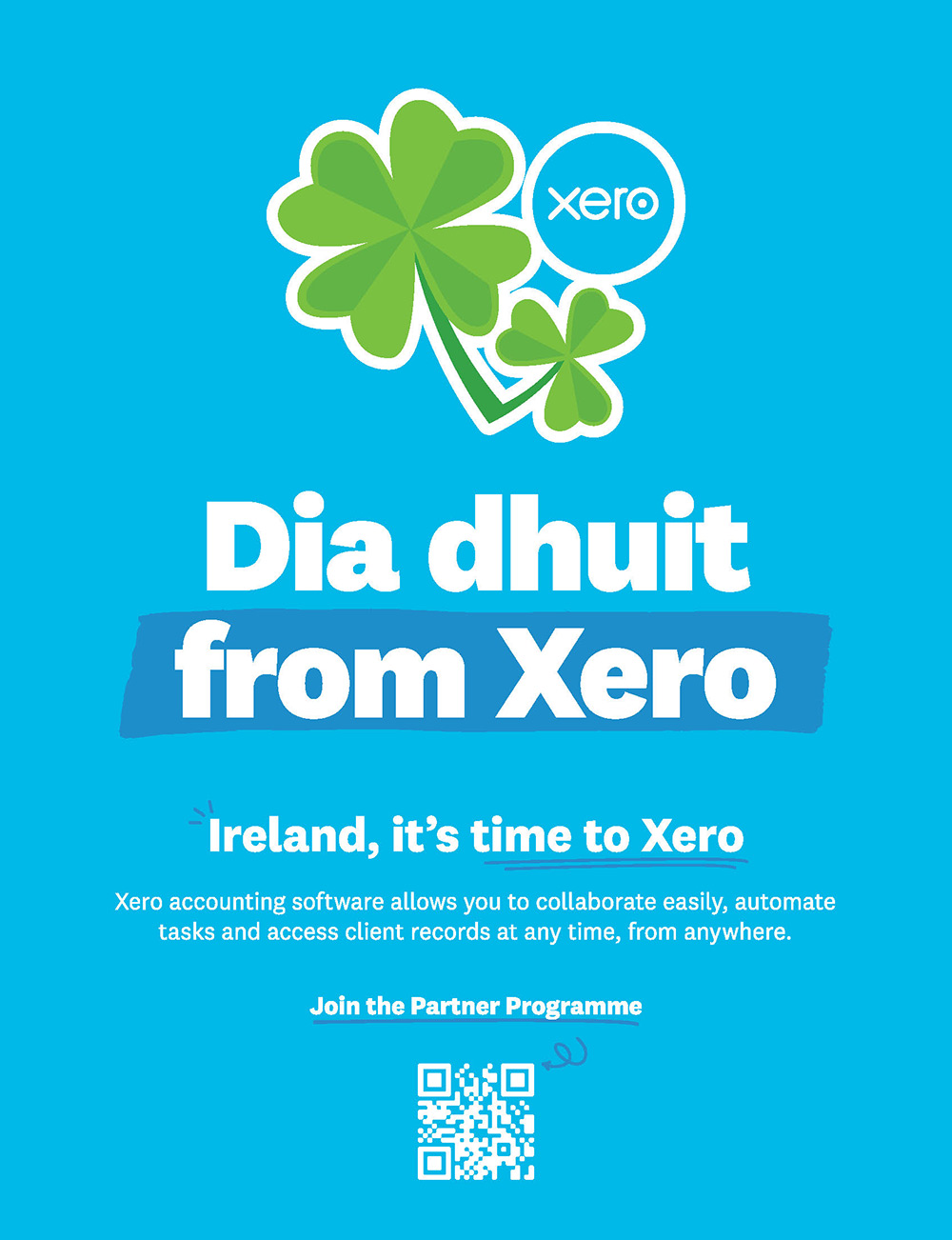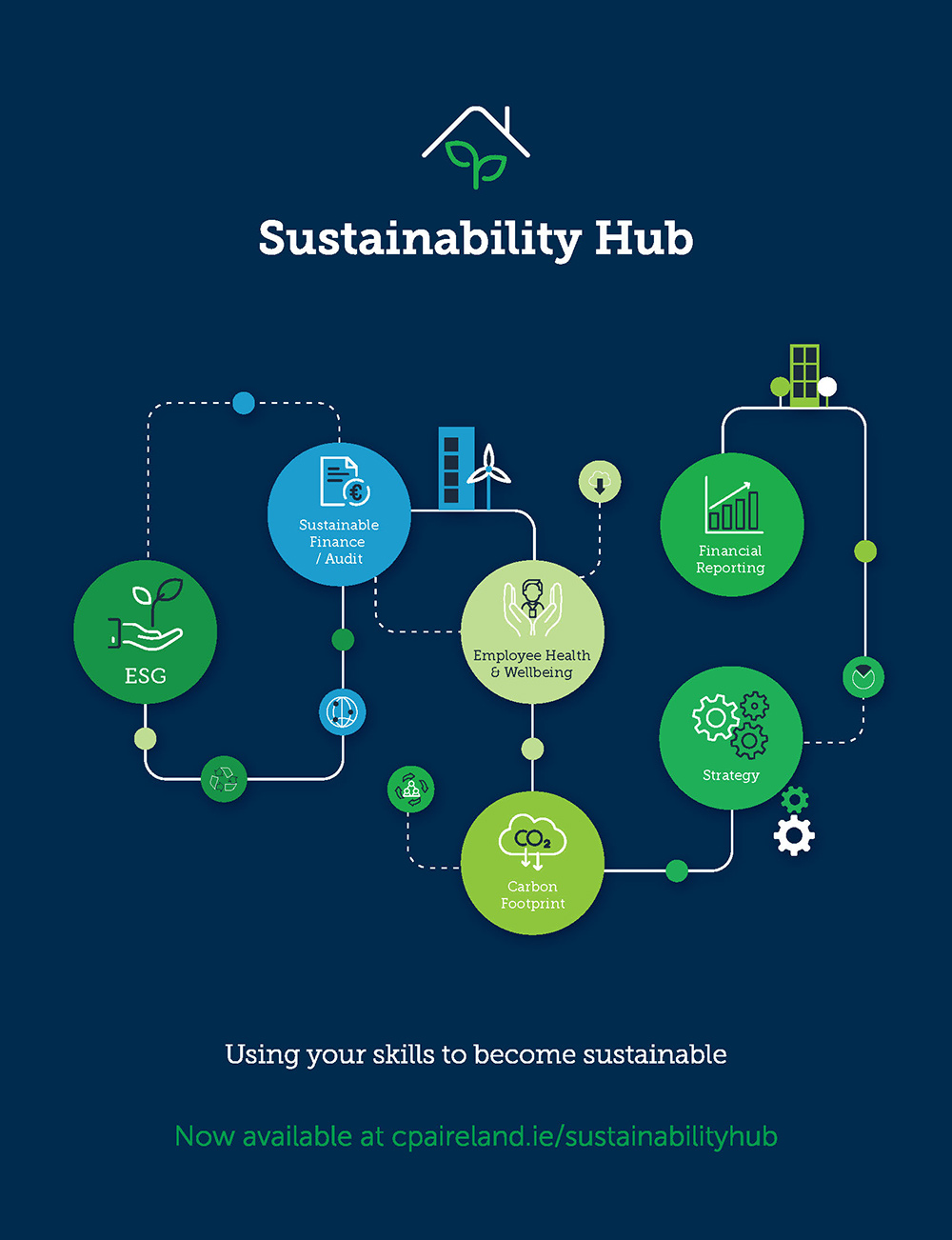March 2023
17 Harcourt Street,
Dublin 2, D02 W963
T: 01 425 1000
F: 01 425 1001
Unit 3,
The Old Gasworks,
Kilmorey Street,
Newry, BT34 2DH
T: +44 (0) 28 3025 2771
W: www.cpaireland.ie
E: cpa@cpaireland.ie
Patricia O’Neill
Chief Executive
Eamonn Siggins
Editorial Adviser
Róisín McEntee
Technical Adviser
Phyllis Willoughby
Ciara Durham
T: 086 852 3463
E: accountancyplus@gmail.com
Published by
Nine Rivers Media Ltd.
E: gary@ninerivers.ie

We had the pleasure of announcing a new partnership with the Chartered Institute of Internal Auditors (CIIA). Members of CPA Ireland now have the option to join the Chartered Institute of Internal Auditors by passing the online CIA challenge exam and satisfying the qualifications for good standing.
CPA Profile
Opinion
Cryptocurrency by Henry Duggan, Andrew Pimlott and Madhur Mishra
The concept of cryptocurrency has attracted widespread attention in recent years. At the simplest level, a cryptocurrency is essentially a digital currency which utilises advanced cryptography to facilitate anonymity and security in transactions. Cryptocurrencies can therefore be viewed as forms of digital money which can be used to purchase goods and services. Examples of such cryptocurrencies are Bitcoin, Ethereum, Ripple and Cardano.
Cryptocurrency trading can be conducted by both retail traders (individual investors) as well as institutional traders (large organisations such as hedge funds). Because of the volatility and potential for high returns, cryptocurrency trading can be inherently risky. As such, traders should be well-informed and cautious when conducting such trades. It’s also important to utilise a reliable and reputable cryptocurrency exchange. Some exchanges are more appropriate for beginner traders, while others are designed for those with significant experience of conducting such trading activity.
This article will provide an insight to the basic underlying technology associated with cryptocurrencies, along with a synopsis of the key highlights in their development, advantages and risks, regulatory environment and financial reporting requirements.
Michael Smyth
Michael Smyth

Title: Vice President, Financial Planning & Analysis
Company: Dell Technologies
Qualifications: CPA MBA
I was born and raised in Limerick and sat my leaving cert in Castleknock College in Dublin and attended University of Limerick where I graduated with my CPA qualification followed by an MBA. I have worked for Dell Technologies for 32 years, initially in Limerick and later taking assignments in South Africa and Slovakia before settling down with my family in Austin, Texas. I have been married to Caroline for 35 years and have two adult children, Naomi and Andrew who both live and work in Austin.
I always enjoyed accounting in school and university. I started my working career in Supply Chain for a tech company, Wang Laboratories, but realised early on my passion was finance. I joined the Dell Technologies finance function, but I knew I needed the accounting qualification to be successful, and to gain the required expertise, credibility and confidence. You can only get so far without the qualification, and it’s a game changer and a ticket to entry for leadership positions.
Chloe O’Sullivan
CPA Profile
Chloe O’Sullivan

Title: Assistant Manager
Company: Quintas
Qualifications: BA, CPA
FINANCIAL REPORTING
Financial Reporting News
Financial Reporting News
If an entity has related party transactions, it shall disclose the nature of the related party relationship as well as information about the transactions, outstanding balances and commitments necessary for an understanding of the potential effect of the relationship on the financial statements.
At a minimum, disclosures shall include:
(a) The amount of the transactions.
(b) The amount of outstanding balances and:
IAS 24 Related Party Disclosures
Related party transactions are the transfer of resources, services or obligations between related parties regardless of whether a price is charged. Where there are transactions between a parent and subsidiary, the entity must disclose the name of its parent and if different the ultimate controlling party.
The identification and documentation of related parties per International Standard on Auditing ISA (Ireland) 550 are included within the article on page 42. “The Importance of Auditing Related Party Transactions”.
FRS 102 – Related Party Disclosure
Section 33 of FRS 102 requires an entity to include in its financial statements the disclosures necessary to draw attention to the possibility that its financial position and profit or loss have been affected by the existence of related parties and by transactions and outstanding balances with such parties.
This appendix sets out the disclosure requirements for small entities, based on the requirements of Companies Act 2014. Sections 1AD.38 to 1AD.51 deal specifically with related party transactions. It is recommended to review these sections to make the necessary disclosures in the financial statements.
IFRS 17 Insurance contracts in a nutshell by Robert Kirk
There was therefore the need to develop a new standard that could:
Law & Regulation News
New Regulations on Transparent and Predictable Working Conditions
The aim of the new directive is to improve working conditions by encouraging transparency and predictable employment terms. Whilst Ireland had existing legislative protection in place regarding written terms of employment, this new directive introduces further obligations for employers, and we strongly encourage employers to review their terms of employment to ensure that they are compliant.
The major changes are to the following:
Corporate Enforcement Authority (CEA) publishes informative note on the topic of Early Warning Tools and Restructuring Frameworks
The purpose of the document is to provide assistance to company directors in understanding certain aspects of the European Union (Preventive Restructuring) Regulations 2022.
Employment Law Changes, What to Expect in 2023 by Sarah Fagan
What to Expect in 2023
These rights are part of the Work Life Balance and Miscellaneous Provisions Bill (2022), anticipated to be enacted this year. These measures by the government aim to bring Ireland into compliance with the EU Work Life Balance Directive, 2019.
Law & Regulation
Corporate Authority Enforcement Regulatory Update by Ian Drennan
Corporate Authority Enforcement
Regulatory Update
- encouraging compliance with the 2014 Act,
- investigating suspected offences under, and suspected non-compliance with, the 2014 Act, and
- enforcing the 2014 Act, whether by prosecuting summarily (i.e., in the District Court) or by referring matters to the Director of Public Prosecutions for decision as to whether or not to prosecute on indictment (i.e., in the Circuit Court) matters we have investigated.
- launched its new brand, website and social media channels,
- published information and guidance on a range of topical matters,
- welcomed both An Taoiseach, Leo Varadkar TD, and Minister of State, Dara Calleary TD, to its offices,
- engaged in a recruitment campaign aimed at enhancing the CEA’s investigative and enforcement capabilities.
Law & Regulation
5 billion reasons to get comfortable with compliance by Paul Moore
5 billion reasons to get comfortable
with compliance
As is the delayed nature of any financial penalties, the offending actions most likely happened a few years back. What is further alarming is the apparent repeat offending by large firms with the worst offender tipping the scales at over $8 billion and counting in fines since 2008 (the Financial Times Report). Perhaps the penalties being enforced on firms are not enough of a deterrent.
If you are a repeat offender, should you be penalised even further in a way that will affect your business until the message is received? With respect to banks, if they are always deemed as too big to fail, they will always be above the law. Is it simply cheaper to pay a fine than implement correct AML procedures? If so, then the way in which penalties are imposed will need to be revised.
Finance & Management News
Finance & Management News
The public consultation on the corporate sustainability reporting directive opened 30th January 2023 where the Department of Enterprise, Trade and Employment were seeking the views of stakeholders and interested parties on the Member State options contained within the Corporate Sustainability Reporting Directive (EU) 2022/2464, ahead of its transposition into Irish Law.
Minister of State with responsibility for Company Regulation at the Department of Enterprise, Trade and Employment, Dara Calleary T.D., held a webinar 26th January 2023 on the Corporate Sustainability Reporting Directive (CSRD).
CPD requirements for members in Industry
A new CPD cycle commenced in 2023 and per CPD requirements of CPA Bye-Law 8 Members not in Practice and not working in Practice are required to complete a total of 120 hours CPD over a three year CPD cycle of which 60 hours are structured CPD and 60 hours unstructured.
The minimum requirement is 20 hours of CPD of which at least 10 hours must be structured in any one year.
https://www.cpaireland.ie/getattachment/About-CPA/Bye-Laws/Bye-Law-8-1-Jan-2022-(1).pdf?lang=en-IE
Finance & Management
Spotlight on AIB Business Banking Sector Team by AIB
Our Business Banking teams across the country are supported by Sector Specialists all of whom are available to meet customers and provide valuable insights. For example, we have 11 dedicated Agri Advisors based in our Local Markets. Over the years we have found this model to work exceptionally well in facilitating us to provide the best possible service to our clients in conjunction with our colleagues across the organisation.
Managing Insolvency and SCARP by Tom Murray
There has been a marked increase in the number of companies entering into creditors voluntary liquidation since Q4 2022. That trend has continued in Q1 2023 with creditors meetings averaging 10+ per week for the year to date. The trend is across all sectors, but particularly vulnerable sectors of Retail, Hospitality and Construction. Many companies are finding themselves in the situation of being unable to pay their debts as they fall due.
The need to be cognisant of the implications for the company and for themselves personally by continuing to trade, when not being in a position at this time.
At the outset, directors of a company facing challenges need to be able to assess the situation. In this regard, they should conduct a thorough assessment of the company’s financial position, including liabilities, assets, and cash flow.
Taxation News
Taxation News
Revenue is now seeking the engagement of Employers, Software Providers and Agents in the implementation of this reporting requirement. Further information, together with a link to a survey, has issued through their ROS inbox allowing stakeholders to provide information on their current processes that will assist in the design of this new reporting obligation.
Returns of Employees’ Emoluments, etc.
- Any payments made to employed persons in respect of expenses.
- Any payments made on behalf of employed persons and not repaid, and
- Any payments made to the employees in a trade or business for services rendered in connection with the trade or business, whether the services were rendered in the course of their employment or not.
Every employer, when required to do so by notice from an inspector, shall within the time limited by the notice prepare and deliver to the inspector a return containing:
- Names and places of residence of all persons employed by that employer.
- Particulars of any car within the meaning of Section 121 made available to those persons by reason of that employment.
- Particulars of any preferential loan within the meaning of Section 122 made, released or written off by that employer in whole or in part and particulars of any interest released, written off or refunded by that employer in whole or in part and which was payable or paid on such loan.
New Revenue Audit Code of Practice by Mairéad Hennessy
The Experience So Far
It replaces the Code of Practice for Revenue Audits and other Compliance Interventions 2019 (the 2019 Code) however compliance interventions that were in progress prior to 1 May 2022 will continue under the 2019 Code.
Sustainability In Irish Agriculture by Declan McEvoy
Its hugely important when preparing projections and plans to be on the conservative side as there will be pressure on farm incomes in the years to come.
This article gives an outline of the tax issues and the background to what is happening. I look forward to presenting on the more technical points of the article at the upcoming CPA Tax Conference on 9th March.
In Practice News
The successful candidate will conduct Quality Assurance reviews throughout Ireland in addition to providing members with assistance on technical issues. Opportunities to assist in the development of CPD courses and enhance the effectiveness of technical committees.
For further details
The published decisions extent over a range of accounting treatments applied under accounting requirements including:
- IAS 36 Impairment of Assets
- IAS 37 Provisions, Contingent Liabilities and Contingent Assets
- IFRS 8 Operating Segments
- ESMA Guidelines on Alternative Performance Measures
- Management Report – Transparency (Directive 2004/109/EC) Regulations 2007
These published decisions are either instances where the company voluntarily agreed to enhance its accounting treatment or disclosures in future financial reports to address matters identified during IAASA’s examinations or decisions where IAASA agreed with the accounting treatment applied by the company.
It is noteworthy that, reflecting public concern about climate change companies’ responses to that and the sustainability agenda, for the first time these decisions cover accounting for climate change and sustainability initiatives.
The financial reporting decisions for each company are included in a compendium of decisions which may be accessed here:
Professional Scepticism by Brendan Lenihan
Accountancy at the crossroads of science, art and psychology
Surprisingly this isn’t an article focusing mainly on fraud, it is as much -if not more – about avoiding serious mistakes for your business or practice. It is more relevant, in my view, for business leaders, company directors, Audit & Risk committee chairs and CFOs as it is for auditors.
The Importance of Auditing Related Party Transactions by Phyllis Willoughby
Auditing Related Party Transactions
How our thinking can impact our decisions… by Fiona Buckley
When left to fester, these unprocessed thoughts can act as serious blockers to our self-improvement and self-development. These internal critics may cause us to make irrational decisions or to not make a decision at all. Let’s examine each of them below:
Is it time to ditch the spreadsheets? by Ayman Kaouri
Firstly, they rely on a lot of time-consuming and often tedious manual labour. It’s time that could be better spent advising your clients – or simply having a better work-life balance.
They are also only as accurate as the data that’s in them. When manual data entry is involved, there’s always the risk of error. If one number is input incorrectly, something is copied and pasted incorrectly or there is a formatting error, it can cause a lot of headaches down the line and be costly for your practice. You’re probably extremely careful for this very reason – but it’s a lot of responsibility for you and your staff, and even the best of us can make a mistake sometimes.
CPAs are using the new .cpa domain by Chris Cromer
And then there are the brand benefits. When it comes to using the .cpa domain to support their brand and marketing strategies, firms have been steadily innovating, creating new opportunities and advantages that weren’t immediately obvious. As a result, in only a short time the profession has seen a host of new domain strategies take flight – and they’re just getting started.
IT
Is the exponential growth in accounting software destroying critical thinking by Danielle McWall
Critical thinking is considered one of four key 21st century skills, the others being communication, collaboration, and creativity.2 To prosper in the 21st century, students need more than knowledge, they need the ability to collaborate, communicate and problem-solve3 plus the ability to connect. Mazzola-Randles (2020) identified connectedness as the fifth 21st Century skill and it includes, “consideration of digital wellbeing and digital identity, contribution in a digital environment, commitment to learning, curating and supporting digital content and building communities,”4 these qualities are viewed as essential for students to become successful in the 4th industrial revolution.
INSTITUTE
Institute News
Institute News
Chloe from Banduff, Co Cork was the top performing student in Ireland in the CPA Ireland examinations for 2022 and was awarded the Liam Donnelly Medal in recognition of her achievement.
This award is made in recognition of the first Chief Executive of CPA Ireland, Liam Donnelly.
As part of the Professional Standards team the successful candidate will be required to:
- Conduct the Institute’s programme of Quality Assurance (QA) reviews from planning to reporting for selected practices, including onsite reviews throughout Ireland.
CPD News
CPD News

Sustainability Hub
If you graduated in December 2022, your CPD requirements begin in January 2023, which is year 1 of our 3 year CPD cycle.
Student News
Consolidations Webinar Series
For students of Professional Level Financial Accounting and Strategic Level Advanced Financial Accounting we have published a series of webinars on the topic of Consolidations.
Corporate Law Webinars
Three new webinars are now available covering The Irish Legal System, Company Law, and Contract Law.
Paper Specific Articles
A number of articles have been published recently by the CPA Examinations Team for the subjects shown below, and further articles will be published during 2023.
Sustainability in Business
Article by Dr. Anushree Priyadarshini on behalf of the CPA Examinations Team for Foundation Level Management Fundamentals, January 2023.
By Mr. Conor Foley, B. Comm., MAcc., ACA, Dip IFR, on behalf of the CPA Examinations Team for Foundation Level Financial Accounting, January 2023.
Taxation of Rental Income
Article by David FitzGerald, CTA, on behalf of theCPA Examinations Team for Foundation Level Taxation, January 2023.
Current Events and Developments in Financial Reporting (The Conceptual Framework – an approach)
Article by: CPA Examinations Team for Professional Level Financial Reporting and Strategic Level Advanced Financial Reporting, January 2023.
The Investment Decision – Net Present Value and Internal Rate of Return
By: Dr James Fitzgerald, Technological University Dublin on behalf of the CPA Ireland Examinations Team for Professional Managerial Finance, February 2023.
Information & Disclaimer & Publication Notices
It acts as a primary means of communication between the Institute and its Members, Student Members and Affiliates and a copy is sent automatically as part of their annual subscription. Accountancy Plus is published on a quarterly basis.
The Institute of Certified Public Accountants in Ireland, CPA Ireland is one of the main Irish accountancy bodies, with in excess of 5,000 members and students. The CPA designation is the most commonly used designation worldwide for professional accountants and the Institute’s qualification enjoys wide international recognition.
The Institute’s membership operates in public practice, industry, financial services and the public sector and CPAs work in over 40 countries around the world.
The Institute is active in the profession at national and international level, participating in the Consultative Committee of Accountancy Bodies – Ireland – CCAB (I) and together with other leading accountancy bodies, the Institute was a founding member of the International Federation of Accountants (IFAC) – the worldwide body. The Institute is also a member of Accountancy Europe, the representative body for the main accountancy bodies The Institute’s Offices are at 17 Harcourt Street, Dublin 2, D02 W963 and at Unit 3, The Old Gasworks, Kilmorey Street, Newry, BT34 2DH.
The views expressed in items published in Accountancy Plus are those of the contributors and are not necessarily endorsed by the Institute, its Council or Editor. No responsibility for loss occasioned to any person acting or refraining to act as a result of material contained in this publication can be accepted by the Institute of Certified Public Accountants in Ireland.
The information contained in this magazine is to be used as a guide. For further information you should speak to your CPA professional advisor. Neither the Institute of Certified Public Accountants in Ireland or contributors can be held liable for any error, or for the consequences of any action, or lack of action arising from this magazine.
Ref. : Invest/13/21
The Investigation Committee found prima facie evidence of misconduct by a Member and Member Firm, Jim McCarthy and Mc2 Accountants, Penrose Wharf, Penrose Quay, Cork; as follows:
- Jim McCarthy:
Failure to issue a letter of engagement to a client upon commencement or at any time during the engagement prior to the issue of an invoice in August 2018. {Section 240 of Code of Ethics (2016) refers}.
Mr. McCarthy was offered and accepted a Consent Order, the terms of which are as follows:
- Reprimand
- Fine €5,000
- Mc2 Accountants:
- Failure to issue a letter of engagement to a client upon commencement or at any time during the engagement prior to the issue of an invoice in August 2018. {Section 240 of Code of Ethics (2016) refers}.
- Failure to issue an adequate breakdown of fees charged on an invoice issued to a client August 2018 in accordance with Section 240 of Code of Ethics (June 2016).
Mc2 were offered and accepted a Consent Order, the terms of which are as follows:
- Severe Reprimand
- Fine €15,000
- Contribution towards Institute’s Costs of €3,000
And that details of this Consent Order be published in Accountancy Plus with reference to the Member and Member Firm by name.
23 December 2022
Case Ref: Invest/17/21
At a Disciplinary Tribunal hearing held on 18 October 2022, the following charges of misconduct were proven in relation to Member, Anne Cunningham, Clane, Co. Kildare:
- Breach of Disciplinary Orders
The following orders of two previous Disciplinary Tribunals have not been complied with, which render Ms. Cunningham liable to disciplinary action in accordance with Bye Law 6.5.1(c) and is a breach of the fundamental principle of the Code of Ethics – Section 115 Professional Behaviour:
Case Ref: Invest/02/19
On 15 September 2020, a Disciplinary Tribunal ordered that Ms. Cunningham pay a fine of €5,000 and contribute €3,000 towards the Institute’s costs. The Tribunal ordered that this fine and costs be payable by monthly standing order over a period of 36 months commencing as soon as the orders come into effect. This standing order was never put in place and the fines and costs remain outstanding.
Case Ref: Invest/16/20
On 12 April 2021 a Disciplinary Tribunal ordered that:
- the necessary steps be taken to rectify the Companies Registration Office record in respect of the 13 cases which were the subject matter of this complaint, at Ms. Cunningham and her firm’s expense, within 60 days of the Tribunal hearing and this condition to be monitored by the Institute. No evidence has been provided and evidence is not available on the public register to indicate that this condition has been complied with.
- a Quality Assurance Review of Ms. Cunningham’s practice be undertaken at her expense within 18 months of the Disciplinary Tribunal. A Quality Assurance Review was scheduled and notified to Ms. Cunningham, and she failed to engage with this review or in any way acknowledge that this review had been scheduled.
- costs totalling €20,000 be paid to the Institute in equal instalments between July 2021 and 31 December 2023. A monthly instalment arrangement was agreed but only 4 payments were made.
- Failure to facilitate a quality assurance review
- A Quality Assurance Review was scheduled to take place on 3 November 2021. Notice of this review was issued on 27 September 2021, with a number of follow up reminders issued in October 2021. Ms. Cunningham failed to acknowledge receipt of the notifications or to engage in any way with this review and accordingly the review could not take place. (Bye Law 7.3.refers).
Accordingly, the Tribunal of 18 October 2022 ordered that Ms. Cunningham:
- Be excluded from membership;
- Contribute €4,000 towards the Institute’s costs in this case (payable within 30 days of this order becoming effective);
- That all existing fines and costs owed by discharged within 30 days.
The Tribunal also ordered that:
- These findings and orders be published in Accountancy Plus with reference to Anne Cunningham by name.
- That Ms. Cunningham be advised of the implications of exclusion from membership, to include prohibition on the use of the CPA designation personally and on any business publications such as websites, premises, letterhead etc.
- That the Companies Registration Office be advised by the Institute of the matters pertaining to Invest/16/20 and the 13 cases in respect of which the Companies Registration Office record was determined by the then Disciplinary Tribunal to be incorrect and requiring correction. The Companies Registration Office are to be advised that the Institute sought to have the matter rectified but Ms. Cunningham failed to do so, and Ms. Cunningham has been excluded from membership.
15 December 2022


